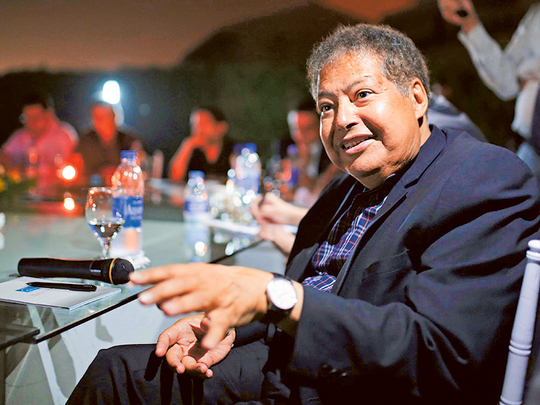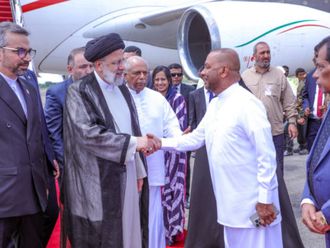
Cairo: Egyptian-American scientist Ahmad Zuwail, who died in the US on Tuesday, is known as the father of femtochemistry, a branch of physical chemistry that studies chemical reactions happening in a matter of femtoseconds.
He is credited with developing a rapid laser technique that has enabled scientists to study the actions of atoms during chemical reactions.
The accomplishment has created a new area of physical chemistry known as femtochemistry. Zuwail won the 1999 Nobel Prize in Chemistry for innovating this technique, becoming the first Arab scientist to claim the prestigious award.
He served as science adviser to US President Barack Obama. In its citation, the committee said Zuwail was awarded the Nobel Chemistry Prize for his studies of the transition states of chemical reactions using femtosecond spectroscopy.
“The world has lost a pioneer and prominent scientist," His Highness Shaikh Mohammad Bin Rashid Al Maktoum, Vice-President and Prime Minister of the UAE and Ruler of Dubai, tweeted on Wednesday evening.
"Our condolences to the Egyptian people and Arab world on the death of Ahmad Zewail. In all my meetings with Zewail, I saw a scientist that linked his scientific excellence with a vision for a practical project that would bring about progress and growth for the Nation. And this is how a person should be to bring about a positive and real change in their community.”
Zuwail studied atoms and molecules in “slow motion” during a reaction and seen what actually happens when chemical bonds break and new ones are created, says the California Institute of Technology (Caltech) where he worked for years.
His technique uses what may be described as the world’s fastest camera, according to Caltech. “This uses laser flashes of such short duration that we are down to the timescale on which the reactions actually happen — femtoseconds (fs). One femtosecond is 10 raised to the power of -15 seconds, that is, 0.000000000000001 seconds, which is to a second as a second is to 32 million years,” the institute adds.
Femtochemistry enables scientists to understand why certain chemical reactions take place but not others. “We can also explain why the speed and yield of reactions depend on temperature.”
Scientists around the world are studying processes with femtosecond spectroscopy in gases, fluids and solids, on surfaces and in polymers. Applications range from how catalysts function and how molecular electronic components must be designed, to the most delicate mechanisms in life processes and how the medicines of the future should be produced, explains Caltech.
Zuwail-inspired femtochemistry is believed to have revolutionised the scientific community’s view of chemical reactions. “From a phenomenon described in relatively vague metaphors such as ‘activation’ and ‘transition state’, we can now see the movements of individual atoms as we imagine them,” says Caltech. “They are no longer invisible. The femtochemistry research has led to explosive development. With the world’s fastest camera available, only the imagination sets bounds for new problems to tackle.”
Zuwail was born in Damanhur, Egypt. He joined Caltech in 1976.
“I never ever believed that one day I would get a call from Sweden as a boy,” he said after receiving the Nobel. “I had passion about science. My mother said I was going to burn the house (with chemistry experiments).”
Zuwail authored some 600 scientific articles and 16 books and was showered with honours from around the world, including France’s highest honour, the Legion d’Honneur, and Egypt’s Order of the Grand Collar of the Nile.
In 2009, the president named Zuwail, a naturalised citizen, to the Council of Advisors on Science and Technology and later that year made him the first US science envoy to the Middle East.
He joined the United Nations Scientific Advisory Board in 2013. In his homeland, he set up the Zuwail City for Science and Technology in the Shaikh Zayed quarter on the outskirts of Cairo. The institution, which was officially inaugurated in late 2011, has the stated mission of bringing about effective participation in the 21st century and upgrade local technologies to world standards.
Egyptian President Abdul Fattah Al Sissi expressed his condolences over the death, saying the country had lost a son and role model.
Egyptian media reported that Zuwail’s body would be flown to that country for burial.
Arab Nobel Laureates at a glance
1978: Egyptian President Anwar Al Sadat is co-awarded the Nobel Peace Prize with Israeli Prime Minister Menachem Begin after they have signed the Camp David accord, marking the first peace pact between an Arab country and Tel Aviv.
1988: Well-known Egyptian writer Najeeb Mahfouz wins the Nobel Prize in Literature who- according to the jury- “through works rich in nuance- now clearsightedly realistic, now evocatively ambiguous- has formed an Arabian narrative art that applies to all mankind”.
1994: Palestinian President Yasser Arafat and Israeli Prime Minister Shimon Peres share the Nobel Peace Prize for their efforts to end the Palestinian-Israeli conflict.
2005: Egyptian diplomat Mohammad Al Baradei gets the Nobel Peace Prize as the chief of the International Atomic Energy Agency for “their efforts to prevent nuclear energy from being used for military purposes and to ensure that nuclear energy for peaceful purposes is used in the safest possible way”.
2011: Yemeni human rights activist and journalist Tawakkol Karaman becomes the first Arab woman to receive the Nobel Peace Prize that she is co-awarded along with Liberians Ellen Johnson and Leymah Gbowee “for their non-violent struggle for the safety of women and for women’s rights to full participation in peace-building work.”
2015: The Tunisian National Dialogue Quartet is awarded the Nobel Peace Prize for “its decisive contribution to the building of a pluralistic democracy in Tunisia” in the wake of the 2010 revolt.












